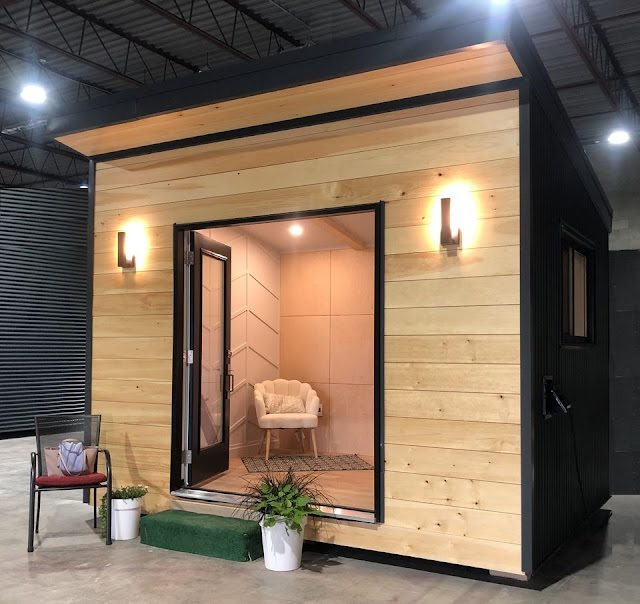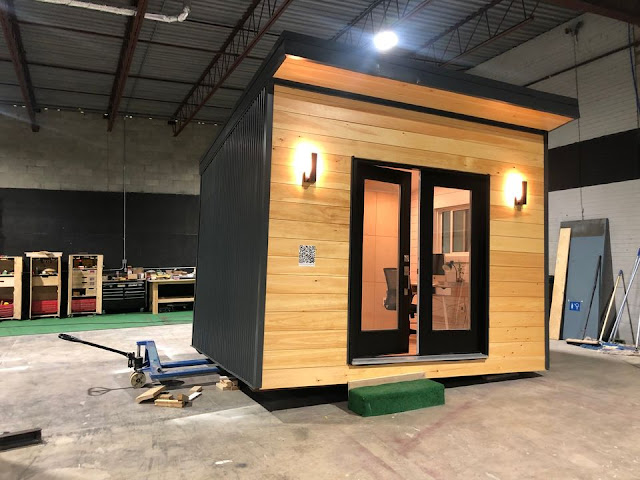Are you looking for a way to expand your living space without breaking the bank? A backyard studio shed might just be the solution you're looking for. A studio shed can be a versatile addition to your property, serving as a home office, art studio, workout space, or even a guest house. In this article, we'll take a look at everything you need to know to create the perfect backyard studio shed, from selecting the right design to outfitting it with the necessary amenities.
1. Why Choose a Backyard Studio Shed?
A backyard studio shed can be a cost-effective way to add extra space to your property. Instead of building an addition onto your home or renting office space, a studio shed can provide a comfortable and functional workspace right in your own backyard. Plus, it offers the added benefit of being separate from your main living quarters, providing a quiet and private environment for focused work or creative pursuits.
2. Designing Your Backyard Studio Shed
2.1 Determining the Purpose
Before you begin designing your backyard studio shed, it's important to determine its primary purpose. Will you be using it as a home office, an art studio, a guest house, or a workout space? The purpose will impact the size, layout, and amenities you'll need to include in the design.
2.2 Choosing the Size and Style
The size and style of your backyard studio shed will depend on several factors, including your budget, available space, and intended use. A smaller shed may work for a home office or art studio, while a larger shed may be necessary for a guest house or workout space. As for style, there are many options to choose from, including traditional, modern, and rustic designs.
2.3 Selecting the Right Material
When it comes to selecting the material for your backyard studio shed, there are several options to consider. Wood is a popular choice for its natural beauty and versatility, but it requires regular maintenance to prevent rot and decay. Vinyl and metal sheds are also available and may require less maintenance, but they may not be as aesthetically pleasing.
2.4 Obtaining Permits and Approval
Before you begin building your backyard studio shed, you'll need to obtain the necessary permits and approval from your local zoning board. The requirements will vary depending on your location and the size and style of your shed, so be sure to do your research and follow all regulations.
3. Preparing Your Site
3.1 Clearing the Area
Once you've selected the location for your backyard studio shed, it's important to clear the area of any obstacles or debris. This includes removing any trees, bushes, or other plants that may be in the way. You'll also want to make sure that the area is free of any underground utility lines or pipes.
3.2 Leveling the Ground
Before you can lay a foundation for your backyard studio shed, you'll need to ensure that the ground is level. Use a shovel and a level to remove any high spots and fill in any low areas. You may also want to consider laying a layer of gravel or sand to create a stable base for your foundation.
3.3 Laying a Foundation
The foundation of your backyard studio shed is crucial to its stability and longevity. There are several options for foundations, including concrete slabs, pier and beam, and skids. Consider the size and weight of your shed when selecting a foundation, and be sure to follow all local building codes and regulations.
4. Building Your Backyard Studio Shed
4.1 Framing the Structure
Once you've prepared your site and laid a foundation, it's time to begin framing the structure of your backyard studio shed. This involves constructing the walls, roof, and floor using lumber and other building materials. Consider hiring a professional contractor if you're not confident in your carpentry skills.
4.2 Adding Insulation and Wiring
If you plan on using your backyard studio shed year-round, it's important to insulate it properly to keep it warm in the winter and cool in the summer. You'll also need to add wiring for electricity and lighting. Consider hiring an electrician to ensure that your wiring is up to code and safe.
4.3 Installing Doors and Windows
The doors and windows of your backyard studio shed are not only functional but also add to its aesthetic appeal. Choose doors and windows that fit with the style and design of your shed, and consider adding locks and security features for added peace of mind.
4.4 Finishing the Interior and Exterior
Once the structure of your backyard studio shed is complete, it's time to finish the interior and exterior. This includes adding siding, roofing materials, flooring, and paint or stain. Consider using eco-friendly materials for a more sustainable and environmentally friendly option.
5. Outfitting Your Backyard Studio Shed
5.1 Furniture and Décor
The furniture and décor of your backyard studio shed will depend on its intended use. If you're using it as a home office, you'll need a desk, chair, and storage solutions. If it's an art studio, you'll need easels, tables, and storage for art supplies. Consider using multi-functional furniture to maximize space.
5.2 Heating and Cooling
To make your backyard studio shed comfortable year-round, you'll need to consider heating and cooling options. This may include a space heater, window air conditioner, or even a mini-split system. Consider the size of your shed and your local climate when selecting heating and cooling options.
5.3 Lighting and Electrical
Proper lighting is essential for any workspace, so be sure to include ample lighting in your backyard studio shed. Consider adding overhead lighting, task lighting, and natural lighting through windows. You'll also need to ensure that your electrical wiring is up to code and safe for your intended use.
5.4 Storage and Organization
To keep your backyard studio shed functional and clutter-free, you'll need to include plenty of storage and organization solutions. This may include shelves, cabinets
for art supplies, file cabinets for paperwork, or pegboards for tools. Consider using vertical storage solutions to maximize space.
6. Maintaining Your Backyard Studio Shed
6.1 Regular Cleaning and Maintenance
To ensure the longevity of your backyard studio shed, it's important to perform regular cleaning and maintenance. This includes sweeping the floors, dusting surfaces, and checking for any signs of damage or wear and tear. Make repairs as needed to prevent further damage.
6.2 Inspecting for Pests
Pests such as mice, termites, and ants can cause damage to your backyard studio shed. Inspect for signs of pests regularly, and take steps to prevent infestations. This may include sealing gaps and cracks, using pest repellents, and storing food and other attractants properly.
6.3 Protecting from the Elements
Your backyard studio shed is exposed to the elements year-round, so it's important to take steps to protect it from damage. This may include adding weatherstripping around doors and windows, using a water-resistant sealant on the exterior, and clearing snow and ice from the roof in the winter.
7. Conclusion
A backyard studio shed is a versatile and functional addition to any home. Whether you use it as a home office, art studio, or simply a space to relax, it can provide a quiet and peaceful retreat from the hustle and bustle of daily life. With proper planning, preparation, and maintenance, your backyard studio shed can provide years of enjoyment and productivity.


No comments:
Post a Comment
Note: Only a member of this blog may post a comment.